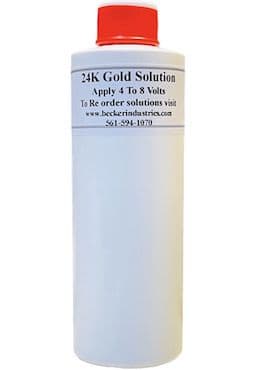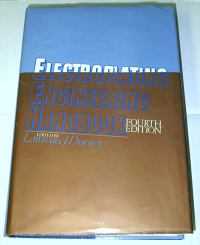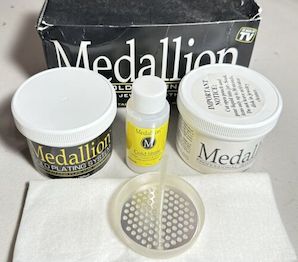
-----
How to Set up a Simple Home Electroplating System
Electroplating can be done at home by a dedicated hobbyist, but practice makes perfect and plating of precious parts shouldn't be attempted until some hands-on experience has been gained through plating of scrap. Small parts are probably more practical to plate than large ones; large parts shouldn't be attempted until some experience has been gained on smaller ones.Substrates that can be plated onto by a hobbyist include steel, brass, and copper. Most other substrates require specialized pretreatments, or are difficult for other reasons, and are a poor starting point for people new to the art & science, trying to learn. Substrates which are poor starting points include aluminum ⇦ why?, stainless steel ⇦ why?, and zinc diecastings ⇦ why?.
s Similarly, while copper, gold, nickel, or zinc plating is doable by a dedicated hobbyist, they should probably avoid silver ⇦ why?, brass ⇦ why? , and chrome ⇦ why? plating. "Spray chrome" ⇦ huh? is shiny paint; it contains no chrome and would be okay for hobbyists.
Be careful about selling plating services or plated parts, because you might be considered a plating jobshop and subject to a host of regulations. Read on ...
< Prev. page (You're on the last page of this topic)
Q. I would like to apply precious metals to animal skulls. I am going to use beetles to clean the skull.Now I am currently trying to find a soft, low melting point, easy to work with alloy that will stick to the bone. This alloy would also be the cathode in the electroplating process. I understand your concerns with liability in regards to plating. Any other thoughts?
Matt
- Helix, Oregon
August 7, 2009
A. Hi, Matt. Please see our FAQ on plating flowers, plants, and animal skulls. There are other ways to metallize things as preparation for plating than to melt metal onto something, and I think you'll find them better for this purpose. Good luck.
Regards,

Ted Mooney, P.E.
Striving to live Aloha
finishing.com - Pine Beach, New Jersey
Ted is available for instant help
or longer-term assistance.
Q. Hey, has anyone tried [brand name omitted by editor] Tank Plating and Brush Plating systems?
Joe Soltis- Scranton, Pennsylvania USA
November 6, 2010
A. Hi, Joe. Sorry, but comparing brands on this no-registration-required site has often led getting long-winded sales pap in return, shills posing as satisfied customers, and rancorous races to the bottom. Sorry but we can only discuss technical issues, not individual brand preferences. But there are a number of suppliers who can easily be found by googling for "hobby plating". Good luck.
Regards,

Ted Mooney, P.E.
Striving to live Aloha
finishing.com - Pine Beach, New Jersey
Ted is available for instant help
or longer-term assistance.
Q. Greetings Ted.
Looks like a great forum with lots of information.
I apologize for not reading all 50,000 pages, but I just want to permanently solve a corrosion problem in a farm tractor. Two small parts, critical to the operation of the diesel fuel injection & control system in the C.A.V. fuel pump repeatedly corrode & seize, requiring the disassembly, cleaning & polishing, and then reassembly of the C.A.V. pump. Very tedious and time consuming, great opportunity to lose parts when done in the field, etc.
Both of the affected critical parts would fit in a coffee cup at the same time, and, since they rust, appear to be ferrous metal.
After reading the basic tutorial, it appears it would be simple to zinc plate these parts in the farm shop.
Would it be faster to use battery acid
⇦ on
eBay
or
Amazon [affil link]
electrolyte as the liquid (instead of vinegar
⇦in bulk on
eBay
or
Amazon [affil link] )? or dissolve a zinc anode in the electrolyte, then "dip & wait"? (as mentioned in "solution disposal")?
nr
What would the effect be of raising the current source from a flashlight battery to a 12 volt vehicle battery?
I realize that that depositing material (zinc, copper, chrome, or other) will cause the parts to be a different size afterwards, and I will have to get it back to the correct size in the critical area, either by pre polishing (we've already polished it a lot!) or post polishing.
We don't care what it looks like; I would like not to have to ever see it again, but until we solve the corrosion issue, this machine has way too much unplanned maintenance.
Obviously, to remove the corrosive from the fuel would be step #1. Apparently that hasn't happened so I am looking for additional things to solve the problem without spending large sums of money, preferably things I can do with materials on hand.
#2, "new" parts installed in this equipment also corrode as fast as the old parts.
I understand this process is probably hazardous, I am aware of safety issues, and would like to avoid problems by being aware of them, and being prepared.
Thanks for any advice & assistance you can share.
CE
Farm support - Cullman, Alabama, USA
February 14, 2011
A. Hi, Chris. Don't apologize for not doing the impossible of reading every thread -- there are threads here that I haven't revisited in years.
Yes, battery acid is a stronger and better electrolyte than vinegar. And for small scale amateur attempts like this, zinc boat anodes should work as the source of zinc. You will find that 12 volts is way too much though. The zinc ions won't be able to transfer electrons fast enough, so water in the solution will be converted to hydrogen gas, and the parts will "burn" instead of getting good plating. Maybe try rechargeable batteries. A battery pack and charger from an old cordless phone would probably deliver 2.4v or 3.6v that you could perhaps try. Or you could try the under $75 Eastwood system mentioned above. Good luck. But consider having a machine shop make stainless steel replacement parts?
Regards,

Ted Mooney, P.E.
Striving to live Aloha
finishing.com - Pine Beach, New Jersey
Ted is available for instant help
or longer-term assistance.
Q. Ted, I want to silver plate some old British Pennies "Victorian" to make some pieces of jewelry for my Granddaughter "Victoria" I think this would require something quite small to do this like maybe a fish tank...What do suggest for equipment John Harvey??
John HarveyHobbyist - Cambridge Ontario Canada
May 18, 2011
A. Hi, John. Please see our FAQ "Silver Plating at Home".
The non-electrolytic silver plating from commercial silvering solutions ⇨
is quite thin, but may be up to what you need, and it's certainly a much easier way than electroplating. Good luck.
Regards,

Ted Mooney, P.E.
Striving to live Aloha
finishing.com - Pine Beach, New Jersey
Ted is available for instant help
or longer-term assistance.
Q. Uh, I don't have a dog in this fight, but I AM curious about a similar process that I have used to remove rust, paint and old finish from motorcycle parts. I use a soap solution, and a AC/DC 12V source. The crap comes off over night and leaves a truly workable surface for painting.
I'm wondering if, should I simply reverse the poles of the DC source----assuming that I have prepped the selected item well enough--- and provided some source of material such as junk silver jewelry for a silver finish, could there be a reasonable plating outcome? Thoughts?
Best Wishes,
Bruce
Education - Lindenhurst, Illinois, USA
October 2, 2011
A. Hi, Bruce.
There will certainly be an outcome: we have an FAQ that teaches 2nd and 3rd graders how to zinc or copper plate with kitchen-safe materials in minutes. In principle electroplating is very very easy. The hard part is obtaining truly useful plating -- plating that will adhere rather than brush right off or peel off; plating that is free of pits and porosity which accelerate corrosion rather than retard it; plating that will have a good shine to it and reasonable thickness. I think your prospects for plating with home brew are better for nickel plating than silver plating though. Good luck.
Regards,

Ted Mooney, P.E.
Striving to live Aloha
finishing.com - Pine Beach, New Jersey
Ted is available for instant help
or longer-term assistance.
Q. Hi Ted,
I'm looking to increase my knowledge of the principles and practice of metal finishing, with a view to turning my brush-plating hobby into a more serious business venture. I've successfully plated several small objects and have had many people offer to pay me to plate objects for them, but here in the UK there appears to be a dearth of books/guides aimed at amateurs with an interest in the chemistry. I've already researched the criteria for, and costs involved in, setting up a small garage-based electroplating shop and have been given advice on handling, storage and disposal of hazardous/chemical waste. I now want to do some reading to increase my knowledge of the processes involved and I'm therefore looking to obtain guides from overseas, especially the US, which seems to be the place to get information - I therefore wondered if you could point me towards some decent literature which I could order from US...I'll even forgive you guys for spelling sulfur and aluminium wrong :)
Kind Regards
Damien
- Lincoln, Lincolnshire, United Kingdom
May 19, 2012
A. Hi, Damien.
The Metal Finishing Guidebook is probably the least expensive and most available introduction. The Electroplating Engineering Handbook is excellent ⇨
Best of luck.
Regards,

Ted Mooney, P.E.
Striving to live Aloha
finishing.com - Pine Beach, New Jersey
Ted is available for instant help
or longer-term assistance.
Q. Hi Ted. I admire your advice and wisdom. I wonder, have you heard of Nikola Tesla's statement in one of his lectures that he was able to produce single electrode electrolysis? I am an inventor and experimenter who would like some input into perhaps another method to plating involving DC energy of high voltage.
If you or someone you know has read of this, can you expand upon the process? Also, what is the optimum voltage and amperage for the electrowinning of Gold? Thanks in advance.
Daniel.
- Bairnsdale Victoria Australia
April 16, 2013
A. Hi Daniel. I've heard of Nikola Tesla and appreciate that he was probably an under-appreciated genius. However, every book I've seen about him seems wrapped in so much silly mysticism that I'm not going to read them :-)
Sorry, I don't know anything about plating involving high DC energy, although other readers are welcome to chime in.
A plating cell is the same thing as a battery being overcome and driven in the opposite direction. For example, a student's "lemon battery" with zinc and copper electrodes generates 1.2 Volts as the copper plates out onto the zinc. So to plate zinc onto copper will require somewhat more than 1.2 Volts to pump the electrons in the opposite direction. You can look up the "galvanic series" to see the natural electropotentials of each metal, and you'll see that gold is very noble. So the ideal voltage for electrowinning gold will be very low so that you don't plate out anything else that is in the solution.
Regards,

Ted Mooney, P.E.
Striving to live Aloha
finishing.com - Pine Beach, New Jersey
Ted is available for instant help
or longer-term assistance.
Q. Old thread but I have been reading and reading ... and reading ;) Cheers on your patience and openness to the range of questions from rookie to pro.
I have ridiculously fallen in love with cast iron. My first project was an old marine stove that I wired down and polished up.
So as I'm looking at my collection of trinkets I got to thinking about plating. It seems doable after some investment and study. I'm wondering though how you achieve detail in a piece. For example how do do get only the raised letters of a stove plate to be copper plated? I have a very ornate door. It would be neat all copper, it would be better if the copper was mixed with black areas to make it pop.
Cheers,
Brian
- the cove, New brunswick, canada
September 29, 2014
A. Hi Brian. There are two basic ways to do selective plating like that. The first is by masking the area you don't want plated. This can be done with melted wax, masking lacquers, vinyl caps & plugs, or (probably most practical for your case) tape. Platers' tape isn't much different than electricians black tape except it's thicker, usually is green or another color, and the manufacturers are careful or claim to be careful with the selection of the adhesive so it doesn't contaminate the plating baths. My bet is that electricians's tape will be fine for amateur use. The second way to do selective plating is by brush plating instead of tank plating. Brush plating is sometimes called tampon plating and that's a quicker way to visualize it because the tool you use is closer to a tampon than a brush. You tightly wrap an electrode with a few layers of cloth, then dip it into plating solution, and wipe it across the area that you want to plate. Good luck.
Regards,

Ted Mooney, P.E.
Striving to live Aloha
finishing.com - Pine Beach, New Jersey
Ted is available for instant help
or longer-term assistance.
A. Plan B--Copper plate the entire thing and then fill in the recesses with an appropriate paint. All kinds of gloss and temperature resistance is available. If it is too small for an artist brush you can use a syringe to fill in the cavity.
James Watts- Navarre, Florida
A. Plan C -- Copper plate the whole thing as James suggests, then blacken the whole thing, then rub the blackening off the letters. Look at a high school ring to see how the prominences are bright and the relieved areas are dark.
Luck & Regards,

Ted Mooney, P.E. RET
Striving to live Aloha
finishing.com - Pine Beach, New Jersey
Ted is available for instant help
or longer-term assistance.
Q. Hi Jim
I have read through your posts on "home plating" and plating kits.
I am in the process of starting up a small one man artisan business and plan to be doing small scale acid copper and acid nickel plating - no cyanide / no chrome just the usual salts of copper and nickel and the associate acids which I buy at 30% and dilute.
I am not going to be offering a plating service, merely plating my own hand made products.
I wondered whether you would offer the same level of caution to these forms of caution as you do to chrome? I am not talking of my safety here as I understand the chemicals more the issues of commercial plating.
I am not in the US and will follow local regulations but I am environmentally aware and would always wish to prevent leaks by secondary containers and also to deal with any disposal issues responsibly ( I hope not to dispose of electrolytes any time soon as I have been informed that with proper care they can last almost indefinitely ).
I have a reasonable background in chemistry handling acids and so on.
I am in the position of a start up and I am trying to keep costs in the thousands rather than tens of thousands but at the same time I do intend to fabricate and buy a decent setup, I would of course be using sensible precautions like secondary containers to safeguard against leaks and appropriate safety measures for myself and rescue/fire although my workshop is ordinarily off limits to everyone except me and family members - no employees.
My largest objects would fit in a two foot cube.
I have been conducting small scale testing on plating miniatures of my product and everything works fine, currently I am not operating at a commercial level, the test pieces are not for sale.
I have specific reasons for needing to keep this process in house, my secondary processes after plating can never be 100% and sometimes I need to repair the surface and go back to the plating stage - I find I need to be able to tune my plating to the requirements of these secondary processes.
So in short are your cautionary views applicable across the board or do you feel some plating methods and chemistries are more suitable for small scale than others?
Kind regards
- Nordjylland, Denmark
November 4, 2014
|
|
A. Hello Jon, Process Engineer - Phoenix, Arizona USA November 8, 2014 A. I am not in love with plate at home kits. I have only had contact with 1 company. I guess that their prices were fair, but that is debatable depending on your access to chemicals and knowledge. - Navarre, Florida |
Q. Thanks James and Mark
Its good to get gut reaction responses.
I am taking a good look at the issues with Nickel. Acids I am familiar with, I have worked professionally in a lab environment with hazardous materials in earlier years and the things that worry me are contamination issues - acids are black and white, you know whether you have had an accident with acid whereas things like the nickel airborne fumes may inflict damage over an extended period of time - personally I feel happier with the exposure issues you can detect easily, the black and white ones.
Do either of you advocate an extracted fume cupboard approach to acid Nickel? It would be easy and cheap for me to weld up an aluminium framed polycarb cupboard ( after checking first for material suitability ) if this is feasible then I would consider it worth the effort, I have also been considering whether it would be easiest to do away with fume balls and simply have a lid that descends into the tank as the workpiece descends - I have the advantage that all my workpieces are revolved spun surfaces (similar for plating tanks) so I do not need to plan for odd shapes, it would be simple enough to have the lid and workpiece moved down as a single unit on a central pole.
If I could I would gladly hand the nickel flash plating over to a professional so that I retain the flexibility of being able to do the copper plate myself but I am concerned with oxidation, I wonder how bonding might be affected with a four day delay between nickel and copper assuming of course that I use a pickle to activate the nickel surface.
I should add that part of my process involves a ceramic coating and the copper plated items are subject to elevated temperatures in a kiln after plating - I have found that copper plate holds up well but only if cleaning procedures are surgical, in my experience plating that seems well bonded at room temperature may not be so at elevated temperatures, it took me a while to achieve the levels of surface preparation required to reliably survive the heat process but now its stable with almost zero rejects.
I am also looking at the possibility of reducing my electrolyte volume by plating sheet metal before it is formed so that I can plate a flat sheet rather than a formed object, this would simply reduce volumes perhaps by as much as a factor of ten although I would lose a degree of flexibility as would need to retouch edges that have to be cleaned up - cut as part of the post forming process, this being unnecessary if the item is plated after forming. I have no idea how the copper plate would stand up to the forming process - shortest route is to suck it and see I think.
Thanks again...
- Nordjylland, Denmark
November 9, 2014
A. Hi Jon
I too have many reservations about home plating but there are two important points that have not been mentioned.
What is the base metal? Acid copper plating on steel is near impossible to get good adhesion -- which is why professionals use cyanides (or pyrophosphate which is difficult to control)
Also, the plating stage comes at the end of an appropriate (and essential) cleaning process which again depends on the base metal and will require tanks, rinsing, heating, waste disposal, etc.
Remember that it is easy to get elementary advice on the internet but when things do not go to plan (and they won't) you are left with the mess.
Surely there is a local plater who can help.

Geoff Smith
Hampshire, England
|
|
A. Hello Jon, Process Engineer - Phoenix, Arizona USA Q. Hi Geoff, - Saltum Nordjylland Denmark |
A. Hi Jon
If we underestimated your qualifications for this type of work, I would point you to the title of this thread "Plating at home".
We get a large number of questions asking for help with processes which are clearly beyond the understanding of the questioner.
You do indeed seem to have the basic knowledge in place, and to go further is probably beyond what is practical on an internet forum.
I would suggest that you contact the Institute of Materials Finishing - there is a link on this site or go straight to http://www.materialsfinishing.org/
They run distance learning courses on all aspects of plating and issue regular updates on EU regulations etc.

Geoff Smith
Hampshire, England
Hello again Jon,
When responders on this site give advice (including myself), we don't assume the person asking the questions is an amateur. In your earlier letter you stated that you had experience in handling chemicals and in a later letter had worked in a wet lab with hazardous chemicals. It was also good to hear that you went through the proper channels regarding environmental requirements in Denmark. If you had stated this early on, our responses would have been different. If I may speak for other faithful responders on this site, we give advice based on decades of experience. I would like to think our goal is to help others and if applicable, warn them of the pitfalls in electroplating. Good luck with your venture, and I wish you success.
Process Engineer - Phoenix, Arizona USA
Q. Hi! I had had an interest in electroplating for some of my old tools but after reading your very informative comments I have come to realize that I will leave it to the pros and save myself the hassles. Life is complicated enough and I have kids. Rather pay someone and get it done right. I read there may be safer systems of electroplating like zinc and gold is this correct ?

Patrick Morin
Mechanic - Acton Vale, Quebec
March 30, 2015
A. Hi Patrick. Yes, cyanide-free zinc, copper or gold plating would be both safer and easier than chrome plating. Nickel plating may be the best single plating for a hobbyist to focus on. But functional electroplating is not easy. As the first step please try the zinc and copper plating student experiments we describe in the previously mentioned FAQ "How Electroplating Works", so that you can see for yourself how the process works while also learning the limitations. Then you can move on from there if you wish. Good luck.
Regards,

Ted Mooney, P.E.
Striving to live Aloha
finishing.com - Pine Beach, New Jersey
Ted is available for instant help
or longer-term assistance.
How to repair pits in old diecastings
Q. I own a 1988 boat that has two 4" chrome bilge vents. They are very slightly pitted. Mine look much better than this picture from eBay .

I brought them to a shop here in Sacramento and was quoted $500 to chrome both vents. Apparently they are pot metal and pits need to be filled with lead before being plated. I'd like to know more about that process. Is it lead plating?
Don StockerReal Estate - Sacramento, California USA
May 13, 2015
A. The usual method is to strip, clean, copper plate, fill the pits with tin-lead solder, polish and buff smooth, then copper-nickel-chrome plate.
It's a time consuming process, since deep pits will have to be manually cleaned of corrosion to sound metal, possibly with a drill bit or Dremel
⇦ on
eBay or
Amazon [affil link] . An expert might spend a few minutes per pit, and your part has hundreds.
$500 sounds like a lot of money, but given the man-hrs required may well be a fair price.

Jeffrey Holmes, CEF
Spartanburg, South Carolina
Q. Does solution temperature affect either the quality of plating or the amount of time it takes to acquire a good plating?
Michael Horton- memphis, Tennessee usa.
July 7, 2015
A. Hi Michael. A point that I've tried to make many times, with limited success, is that plating is drop-dead easy in concept (third graders can learn to electroplate things themselves within 5 minutes). And in a few very limited cases, useful plating isn't especially difficult either: jewelers easily plate gold jewelry, and people easily strip the chrome from auto emblems and gold plate them ...
But useful, robust, bright, pore-free, corrosion-resistant, strongly adhering, good-enough-to-sell plating on other than jewelry and previously plated auto emblems can be very difficult. Further, a plater must be concerned not just with successfully plating one item, but in not ruining his solutions by contamination or by letting them get out of whack; plating "in equilibrium" is very important and quite hard to do. Finally, commercial plating almost always involves organic wetters, brighteners, levelers, etc.
Moving on to your specific question, those organic addition agents are usually very temperature sensitive. So, usually, it's not so much a question of the acceptable temperature range for the copper sulphate, copper fluoborate, copper pyrophosphate, or copper cyanide per se, but the acceptable temperature range for those addition agents.
Regards,

Ted Mooney, P.E. RET
Striving to live Aloha
finishing.com - Pine Beach, New Jersey
Ted is available for instant help
or longer-term assistance.
Q. Hi,
First of all, thank you for providing your advice.
I have a 50 year old keepsake gold-plated wrist bracelet that has lost so much plating the majority of the chain pieces are down to the brass base metal. I have asked local jewelry repair shops if they can re-plate the item but nothing positive (part of the problem may be small population so no demand) so I queried the manufacturer and got the same response. Would one of the inexpensive online gold plating kits work to keep the green off my wrist?
Thanks again,
Ray
- Hanapepe, Hawaii USA
September 11, 2016
A. Hi Ray. The quality of anything you can do will probably be significantly lower than the original plating, so you're more likely to get 50 days or 50 weeks from it rather than 50 years. But what I would probably do is try the simple electricity-free systems that have an activating disk and are heated in a microwave oven, and then apply a simple clearcoat like Everbrite [a finishing.com supporting advertiser].
Regards,

Ted Mooney, P.E. RET
Striving to live Aloha
finishing.com - Pine Beach, New Jersey
Ted is available for instant help
or longer-term assistance.
Q. Thanks for the quick response Ted. I'm afraid I am not at all familiar with 'electroless' plating systems. Can you expound a bit?
Ray
- Hanapepe, Hawaii USA
A. Hi Ray. The issue of electroless plating is difficult, with whole books written about it. It's tricky even semantically, with there being true electroless (autocatalytic) plating, immersion (replacement) plating, and "contact" plating with activating disks which seems to be a combination of autocatalytic and immersion. The short answer would be to follow the link to the Medallion Gold system we linked to on Amazon and read about it and see whether you like the idea. Best of luck.
Regards,

Ted Mooney, P.E. RET
Striving to live Aloha
finishing.com - Pine Beach, New Jersey
Ted is available for instant help
or longer-term assistance.
how do you plate plastic
Kelvin Bellrose- Fort saskatchewan
December 15, 2018
by American Society for Electroplated Plastics
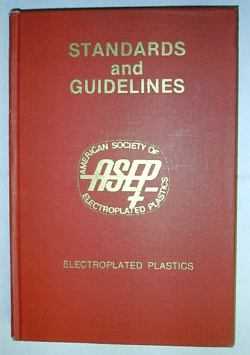
on eBay or Amazon
or AbeBooks
(affil link)
A. Hi Kelvin. If you just want to get some plated metal onto some plastic parts, without precision or real adhesion strength, you can just 'paint' the plastic with something conductive first, like copper-rich paint. Some other methods are listed on our FAQ, "How to Plate Organic Material".
But there are several pretty fat books covering plating on plastic, and they're directed at people who already are skilled at plating on metal, so they skip almost all of that. The techniques involve many steps. In short, there is no way you are going to properly plate plastic automobile grills at home.
No abstract questions please because answering them is impossible :-)
Regards,

Ted Mooney, P.E. RET
Striving to live Aloha
finishing.com - Pine Beach, New Jersey
Ted is available for instant help
or longer-term assistance.
Q. I am a amateur trying to plate a number of small items with a home kit.
I have cleaned the work using an anodic method in an alkaline solution, rinsed and then acid bathed and rinsed again before the plating. I have had a few issues with my power source and a very basic resistor. The power supply gave up so I have started to use a car battery as my power source. The work has plated but in some areas there is something on the surface a little like spatter from welding.
What could be causing this?
Restorer - Birmingham UK
April 18, 2020
A. Hi Tony. Please email some pics to mooney@finishing.com for posting here. Meanwhile, my guess is that it's what we call 'burning'. You can't zinc plate at 12 volts or anything close in a hobby size tank. 3 Volts is probably more like it. Good luck.
Regards,

Ted Mooney, P.E. RET
Striving to live Aloha
finishing.com - Pine Beach, New Jersey
Ted is available for instant help
or longer-term assistance.
Comment: Very interesting thread, Although I am definitely more informed, it has not helped with my wish to try plating at home. I like being independent and self-reliant which is probably my main motive.
The discussion has left me thinking on the one hand I could do some plating and end up having to send it to a professional to do it properly and on the other end up with a perfectly good end product with minimum fuss. I get so tired of endless "safety" education". As a UK train driver every step I take is governed by a plethora of rules, safety catch phrases and anachronisms, along with a mass of signs barking instructions at me at every turn. In the UK we now have commercial vans blurting out "this vehicle is turning left"....how about natural common sense and letting us humans work it out for ourselves.
- oxford, england
May 4, 2020
(affil links)
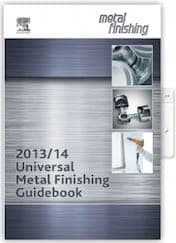
free pdf is currently available from academia.edu
A. Hi John! The issue here is that an internet public forum is the ultimate "one-room brick schoolhouse" -- visited by 3rd graders & post-docturals and everyone in between; visited by people with years of plating experience & by those who have never even mixed pancake batter, and everyone in between. You're tired of warnings but 3rd graders and their parents aren't, and need them.
When people pose an abstract question like "how do I do plating at home", it's difficult to get anywhere. If we say "Regarding the anodes...", we'll be accused of spouting mumbo-jumbo to try to baffle them with bullshit.
But if people tell us that they realize they must practice on scrap rather than thinking they can successfully plate their precious items right out of the gate, and if they tell us their general experience level, and if they tell us exactly what it is that they want to plate, with what, and why, we can almost always help!
Beyond that, we try to write articles on aspects of plating like Faraday's Law (the first thing to understand if you want to do plating), How Plating Works, Introduction to Chrome Plating (explaining the several steps), Intro to Anodizing, Plating Shops for the New Millennium, and many other articles, and we refer people to books which offer knowledge in a more organized fashion than a one-room schoolhouse can.
So, readers, please pose a detailed question and we will be happy to try to answer it :-)
Regards,

Ted Mooney, P.E. RET
Striving to live Aloha
finishing.com - Pine Beach, New Jersey
Ted is available for instant help
or longer-term assistance.
Q. Hi Ted, yes, I see what you mean. The internet comes into my home and appears like a personal conversation with someone I seem to know, or at least have common interests with and yet in perspective the world is very big and diverse but my computer "world" is very small. So, I take your point. Actually, it got me thinking along the philosophical ramifications of this very situation and the dangers of getting lost in the subjective illusion of the computer matrix. I reckon there must be a film in that!
I read a book on electroplating many years ago after seeing someone plate coins in his bedroom with a car battery charger
⇦ on
eBay or
Amazon [affil link]
, kitchen jugs, bits of wire and some small bags of chemicals. This is what made it appear relatively simple and is my only direct experience. To get my motorbike petrol tank plated by a professional is £450 ($560). Do you think I should do it myself or just pay and let someone else do the work?
- Oxford, UK
A. Hi John. I think you'd enjoy trying it so I think you should. You're talking the exterior, right? You can try to nickel plate it. It probably isn't practical to follow that with chrome plating, but you can either gold plate on top of the nickel or just work hard at keeping it waxed.
Small adjustable power supplies are so cheap today that I wouldn't fool with a battery or battery charger. Although 10 A is not enough to bright nickel plate a fuel tank, it's enough to get something even that big nickel plated eventually. But practice with smaller pieces of scrap.
Start by sandblasting if you have the outfit; if you don't have one, scrub with a tampico brush ⇦ on eBay or Amazon [affil link] , pumice powder ⇦ on eBay or Amazon [affil link] , and a little detergent and water if not.
Regards,

Ted Mooney, P.E. RET
Striving to live Aloha
finishing.com - Pine Beach, New Jersey
Ted is available for instant help
or longer-term assistance.
A. Hi John
I am all in favour of people trying their hand a some types of plating. But your motorbike tank poses a couple of problems for you to consider.
The tank on even a small motorbike is quite a large item and therefore requires a big tank with significant amount of chemicals that have to be found and eventually disposed of.
In addition, they float if full of air. You could allow the plating solution to flow in or fill it with water first. Neither is easy to handle and dropping it ...
I see you are looking at nickel plating and that brings more to consider. Brush plating may sound attractive but nickel passivates very rapidly. That means that while plating part of the tank other areas are passivating and any further plating (to build up the thickness) will not bond to the first layer and eventually blister or peel off.
Personally I would look for alternative quotes or settle for a good paint job.

Geoff Smith
Hampshire, England
A. Hello John,
I agree with Geoff - a motor cycle petrol tank is pretty big and will require careful handling and preparation, as well as a large electroplating tank if you choose to go down that route. Geoff also mentions brush plating, which is a good option, if you have the kit available. You need to prepare the tank properly and maybe with a copper layer, otherwise any plating will peel off. Personally, I would not use nickel as the final finish, as it will turn green on prolonged exposure to the weather. You can prevent this by plating the nickel with chromium, although the conventional hexavalent chromium systems are now severely frowned on as the Cr(VI) is a major health hazard. It is worth mentioning that once the chromium metal has been deposited, it is not hazardous as it is no longer Cr(VI)! Another option is to use a nickel-tin coating - this has great properties, such as being highly reflective and corrosion resistant, although its use seems to have dwindled in recent years. This site offers a tutorial on Ni-Sn plating and it is well worth listening to.

Trevor Crichton
R&D practical scientist
Chesham, Bucks, UK
![]() Thanks, I will try smaller items to start with, like levers.
Thanks, I will try smaller items to start with, like levers.
- Oxford, UK
Q, A, or Comment on THIS thread -or- Start a NEW Thread
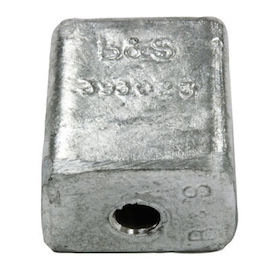
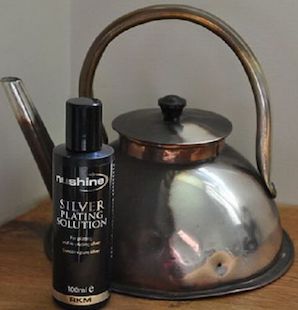 on eBay
on eBay